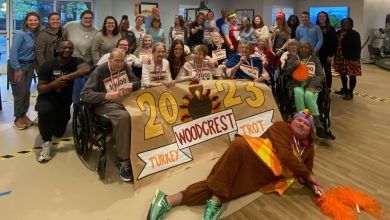
Texas Voters Authorize $3 Billion to Create Dementia Research Institute
By Cheryl Harding | November 18, 2025
Editor’s Note: This article was written and submitted by senior living executive Cheryl Harding, Ph.D. If you are a senior living executive at an organization or a community with an idea for an article that you’d like to write and publish in Senior Living News you’re welcome to submit your idea or written article to Jim Nelson at jnelson@seniorlivingnews.com. We welcome all ideas relating to senior living.
On Tuesday, November 4, Texas voters took a stance that currently impacts the lives of nearly 460,000 Texans and their one million family members who care for them as unpaid caregivers.
Because Texas is growing older faster than the rest of the nation, this is outstanding news.
Now that Proposition 14 has passed, here is what we are likely to see:
- The bill authorizes the State of Texas to provide up to $3 billion over the next decade to establish the Dementia Prevention and Research Institute of Texas, which will fund research on and treatment for dementia, Alzheimer’s disease, Parkinson’s disease, and related disorders
- Leading Texas medical schools will commit grant resources to create centers of influence that will provide cutting-edge dementia and Alzheimer’s research beyond the scope of anything we have ever seen in Texas
- Just as Texas research institutions in cardiology — such as the Texas Medical Center in Houston, and both M.D. Anderson in Houston and UT Southwestern in Dallas — have earned national and international accolades for their research, so will our institutions do the same for dementia and Alzheimer’s
- Texas will attract many of the most brilliant dementia scientists to participate in our research and clinical trials
- Other states will invest in similar research, which will further expedite the speed and depth of innovation
- This research institute will drive innovation that will provide hope for the nearly 460,000 Texans with dementia and Alzheimer’s and their one million family caregivers
- Slowing the progression of the disease through prevention and early detection, this research could help lower long-term healthcare costs in Texas
According to The Alzheimer’s Association, this historic investment will accelerate the search for effective treatments, preventions, and cures, and position Texas at the forefront of the national fight against dementia, Alzheimer’s, and Parkinson’s.
The explosion of dementia cases is forecast to double in the next 35 years because of the rapid growth in the aging U.S. population as life expectancies increase.
With up to $300 million in new annual funding, the most immediate impacts are twofold. First will be the launch of innovative research to expand Texas’s medical capabilities and foster collaboration among research universities, medical institutions, and other partners.
Among the most likely research participants will be UNT Health Fort Worth (formerly known as the University of North Texas Health Science Center), which shares its medical director, Dr. Janice Knebl, with The James L. West Center for Dementia Care.
The second piece of significance is that while The West Center is not a research institution, we put into practice the results of research conducted at UNT Health Fort Worth and other research leaders, such as the University of Texas Southwestern Medical Center in Dallas.
One component of Proposition 14 will be the expansion of education, broadening the scope and capabilities of The West Center. Our team leaders speak at conferences across Texas and the nation — as they did earlier this month at the LeadingAge conference in Boston. Our current catalog of free online caregiver training classes consists of over 100 courses.
Home caregivers are stressed because dementia is new to them. They become overwhelmed at the immensity of their challenge. While they want to give their very best efforts to an aging spouse or parent, their knowledge is limited; therefore, well-intentioned caregivers need training. As a result of training, their loving care benefits their loved one in a caring, compassionate manner.
At The James L. West Center for Dementia care, we firmly believe in two statements:
- A person with dementia is not a problem to be solved; that person is someone to be loved and compassionately cared for in a way that makes them feel safe.
- Know it before you need it: Becoming a caregiver with no advanced notice or training places you and your loved one in a precarious situation. Learning the basics about dementia and the most essential caregiving skills can prepare you to provide adequate support, whether you are helping care for a family member or a friend.
Once again, Texas is demonstrating its leadership in business, healthcare, and quality of life. We look forward to seeing how this commitment leads other states to do the same.
For 32 years, the James L. West Center for Dementia Care, a not-for-profit organization, has served those impacted by dementia. Established by Eunice West in honor of her late husband, James L. West, who passed away due to dementia, the Center continues to build on its excellence in compassionate care and caregiver and dementia education by expanding its service lines to meet the community’s needs. The Center offers residential care, a senior day program, short-term respite care, short-term dementia specialized rehabilitation, a recently launched in-home care program, and professional and family caregiver education, which was recently rebranded as Dementia-IQ Powered by James L. West. The West Center recently received the Silver Award for Innovation from McKnight’s Publishing.
This article has been lightly edited for content and style.





